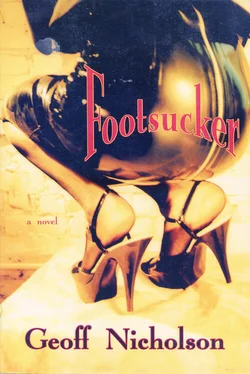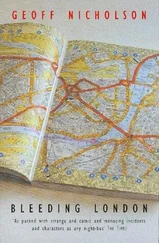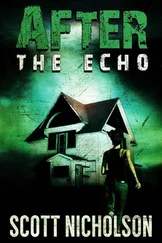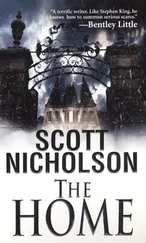So I told him all about Kramer, about my break-in, about the pictures of Catherine’s feet and, for the first time, he seemed to get interested.
‘That’s a strange one, isn’t it,’ he said. ‘That he’s as obsessed with Catherine’s feet as you are. I wonder why. I wonder if she sought him out deliberately. Maybe you’ve given her a taste for it.’
‘Am I supposed to feel good about that?’
‘No, I suppose not.’
I took the few transparencies I’d slipped into my pockets and showed them to Harold. He held them up to the light, peered closely, but didn’t seem very impressed.
‘Do you think he’s called the police?’ Harold asked.
‘No, I don’t think so.’
‘But he knows who you are.’
‘Apparently.’
‘He’ll tell Catherine, no doubt.’
‘I guess so.’
‘This is no way to get her back, is it?’ said Harold sadly.
‘No,’ I agreed.
‘So what are you going to do now?’
‘Sit here for a while. Go home. Get drunk. Get some sleep.’
‘I mean, what are you going to do about Kramer?’
‘What can I do? It’s over with. I probably got what I deserved.’
Harold gave a strange little laugh, somewhat like a hiccup, somewhat like a whoop of delight. ‘How about getting some revenge?’ he said.
‘Like what?’
He reached over and picked up the photograph of Ruth and stared at it, as though he was looking right through it, peering into another world.
He said, ‘You know, above all else, beyond all the other feelings I have, I’m chiefly very angry about Ruth’s death. Still. Perhaps more now than ever. And for a long time I tried to focus that anger. I wanted her death to be somebody’s fault. And it might have been possible to blame the doctors, or our polluted environment, or even to blame God, but in reality Ruth died of what we have to call natural causes, and being angry with nature is as absurd as it is futile.
‘I used to wish that a drunken driver had killed her, or a sex murderer, maybe one of her clients, because then there would have been someone to blame, someone to be angry with, someone to take revenge on. And I’m absolutely sure I’d have taken that revenge. I’d very happily have killed Ruth’s killer.’
He was as cold and as serious as I had ever seen him. He undoubtedly believed what he was saying but I wasn’t at all sure that I did. I’ve no doubt that most of us are capable of murder in certain specific circumstances, but it was still impossible to think of mild little Harold Wilmer as any sort of killer.
‘I’m sorry,’ I said apologetically. ‘I know my loss can’t possibly be in the same league as yours.’
‘Not true,’ he replied. ‘For you things are actually much harder. You’re angry because Catherine’s gone. You want her back but you’re angry with her. She’s both the cause and the object of your anger. You’re so angry with her you could kill her, but if you killed her you wouldn’t have her at all and could never have her again. I can see it’s a difficult situation.’
‘Hey, steady on, Harold. I haven’t the slightest urge to kill Catherine.’
‘No? But you do need a focus for all that anger, don’t you? I always said you did. And Kramer fits the bill nicely.’
It made some sort of sense.
‘OK,’ I said. ‘You could be right. Maybe that’s why I broke into his place, because I was angry and wanted to destroy something.’
‘But you found the photographs of Catherine’s feet and that made you angrier still, I’d guess.’
I wasn’t sure that they’d made me angry exactly, and sitting there in Harold’s armchair, I didn’t feel angry at all. I felt lost, pathetic, trivial. I didn’t say that to Harold. It would have been letting him down. If he wanted to play at being an amateur psychologist, if he wanted to think I was trying to come to terms with my anger, I had no urge to argue.
‘But,’ said Harold, ‘then Kramer caught you and humiliated you. At this very moment, you probably feel as though you want to kill Kramer.’
‘No,’ I protested again. ‘I don’t have the slightest urge to kill Kramer, either.’
Harold was starting to worry me. I’d never seen him like this. These casual, literal references to killing weren’t in character with the man I thought I knew. He looked at the photograph of Ruth again, then at me. I felt he was trying to see what I was made of whether I was quality merchandise, whether I was good enough for whatever he had in mind. I knew I wasn’t.
‘No, perhaps you couldn’t kill Kramer,’ he conceded. ‘But I could.’
Later that night he did.
It was only a small item in the newspaper, the ‘In Brief’ column, hemmed in between an arson attack on a school for the blind and a paragraph about two road builders who’d raped a male hitchhiker. It said,
Mr Robert Kramer, a professional photographer, was found dead in his studio by cleaners this morning. Police say they are keeping an open mind about the cause of death and are anxious to interview friends and colleagues.
Horror and disbelief tumbled over each other in me. I read the item again. It wasn’t enough. I wanted details, a full report, descriptions of the body and the scene of the crime, all the available data about the time and means of death. I wanted to know what goes through a policeman’s ‘open mind’.
I didn’t want to believe it had anything to do with Harold. I hoped it was just a dreadful coincidence, and yet, given the way he’d talked that night, it was all too easy to believe it. I phoned his shop. It was a long time before he answered.
‘Kramer’s dead,’ I blurted.
‘Who?’ said Harold.
‘Come on, Harold, you know what I’m talking about.’
‘I don’t think I do,’ he said.
It occurred to me that maybe the police were already there, that they were listening in on the conversation, hence his reticence.
‘Is there somebody there?’ I asked.
‘Nobody here but me.’
‘Harold, what do you know about Kramer?’
‘I know nothing about anyone of that name.’
‘What are you playing at, Harold? I can’t believe you’re acting like this. Were you there? Did you …?’
I couldn’t bring myself to ask directly whether Harold had committed a murder. Some ludicrous sense of propriety was still in place.
‘I really don’t know what you’re talking about,’ Harold replied.
‘I don’t want to believe you did it,’ I said.
‘Nobody’s asking you to,’ Harold said flatly. ‘How could anyone think I killed a man I’ve neither met nor heard of.’
‘What are you saying, Harold?’
‘It might be better if we didn’t talk for a while,’ he said. ‘Not that we’ve had much in common since Catherine stopped seeing you.’
That was when I truly realized that Catherine’s absence meant as much to Harold as it did to me. If Harold had killed Kramer, and I still hoped to God that he hadn’t, he might like to pretend he’d done it as a favour to me, but it appeared now that he had pressing reasons of his own. It seemed to me that Kramer had taken Catherine away from Harold just as surely as he’d taken her away from me.
‘I’ll be going away for a little while,’ Harold continued. ‘Doing a bit of travelling. Going abroad.’
‘That’s as good as admitting that you did it,’ I said.
‘Not quite.’
‘Where are you going?’
‘It’s probably better if you don’t know that.’
‘What if I need to contact you?’
‘You’ll have no reason to contact me.’
‘I should go to the police about this,’ I said.
‘I think that wouldn’t be very clever of you,’ said Harold. ‘What would you tell them? That Harold Wilmer, a sad old shoemaker, got it into his head to kill a man? They’ll ask how you know, and you’ll have to tell them you were there, that the man stole your girlfriend, that you broke into his flat, that you had a fight. Not very clever at all.’
Читать дальше












